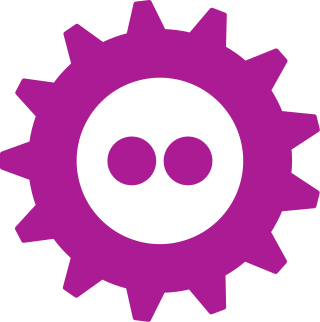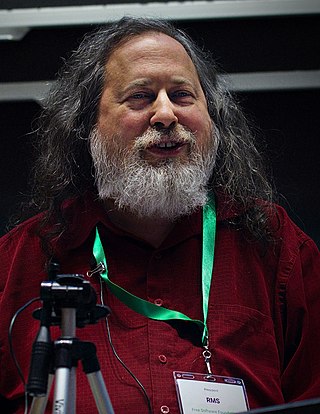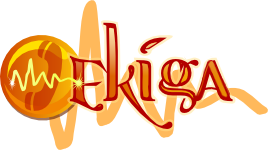The free software movement is a social movement with the goal of obtaining and guaranteeing certain freedoms for software users, namely the freedoms to run, study, modify, and share copies of software. Software which meets these requirements, The Four Essential Freedoms of Free Software, is termed free software.

GNU is an extensive collection of free software, which can be used as an operating system or can be used in parts with other operating systems. The use of the completed GNU tools led to the family of operating systems popularly known as Linux. Most of GNU is licensed under the GNU Project's own General Public License (GPL).

The GNU/Linux naming controversy is a controversy regarding whether computer operating systems that use GNU software and the Linux kernel should be referred to as "GNU/Linux" or "Linux" systems.

The Free Software Foundation (FSF) grants two annual awards. Since 1998, FSF has granted the award for Advancement of Free Software and since 2005, also the Free Software Award for Projects of Social Benefit.

LinuxTag was an annual Free and Open Source Software (FOSS) conference and exposition with an emphasis on Linux but also BSD descendants located in Germany. The name is a compound with the German Tag meaning "Day", as it was initially a single day conference, but soon extended to multiple days, then always including a weekend. LinuxTag was the world's largest FLOSS conference and exhibition for years and aimed to provide a comprehensive overview of the Linux and Free Software market as well to promote contacts between users and developers. With this broad approach LinuxTag was one of the most important events of this kind.

Free and Open source Software Developers' European Meeting (FOSDEM) is a non-commercial, volunteer-organized European event centered on free and open-source software development. It is aimed at developers and anyone interested in the free and open-source software movement. It aims to enable developers to meet and to promote the awareness and use of free and open-source software.

Microsoft NetMeeting is a discontinued VoIP and multi-point videoconferencing program offered by Microsoft. NetMeeting allows multiple clients to host and join a call that includes video and audio, text chat, application and desktop sharing, and file sharing. It was originally bundled with Internet Explorer 3 and then with Windows versions from Windows 95 to Windows Server 2003.
QuteCom was a free-software SIP-compliant VoIP client developed by the QuteCom community under the GPL-2.0-or-later license. It allows users to speak to other users of SIP-compliant VoIP software at no cost. It also allows users to call landlines and cell phones, send SMS and make video calls. None of these functions are tied to a particular provider, allowing users to choose among any SIP provider.

Richard Matthew Stallman, also known by his initials, rms, is an American free software movement activist and programmer. He campaigns for software to be distributed in such a manner that its users have the freedom to use, study, distribute, and modify that software. Software that ensures these freedoms is termed free software. Stallman launched the GNU Project, founded the Free Software Foundation (FSF) in October 1985, developed the GNU Compiler Collection and GNU Emacs, and wrote all versions of the GNU General Public License.

Ekiga was a VoIP and video conferencing application for GNOME and Microsoft Windows. It was distributed as free software under the terms of the GNU GPL-2.0-or-later. It was the default VoIP client in Ubuntu until October 2009, when it was replaced by Empathy. Ekiga supports both the SIP and H.323 protocols and is fully interoperable with any other SIP compliant application and with Microsoft NetMeeting. It supports many high-quality audio and video codecs.
This is a comparison of voice over IP (VoIP) software used to conduct telephone-like voice conversations across Internet Protocol (IP) based networks. For residential markets, voice over IP phone service is often cheaper than traditional public switched telephone network (PSTN) service and can remove geographic restrictions to telephone numbers, e.g., have a PSTN phone number in a New York area code ring in Tokyo.
Opposition to software patents is widespread in the free software community. In response, various mechanisms have been tried to defuse the perceived problem.

Linphone is a free voice over IP softphone, SIP client and service. It may be used for audio and video direct calls and calls through any VoIP softswitch or IP-PBX. Linphone also provides the possibility to exchange instant messages. It has a simple multilanguage interface based on Qt for GUI and can also be run as a console-mode application on Linux.

Empathy was an instant messaging (IM) and voice over IP (VoIP) client which supported text, voice, video, file transfers, and inter-application communication over various IM communication protocols.

Jami is a SIP-compatible distributed peer-to-peer softphone and SIP-based instant messenger for Linux, Microsoft Windows, macOS, iOS, and Android. Jami was developed and maintained by the Canadian company Savoir-faire Linux, and with the help of a global community of users and contributors, Jami positions itself as a potential free Skype replacement.

Free Society Conference and Nordic Summit (FSCONS) is a Nordic conference trying to bridge the gap between software and cultural freedom held each autumn in Gothenburg, Sweden. It shares many similarities with FOSDEM in the way in which the event is structured, but where the latter attracts speakers and visitors primarily interested in Free software, FSCONS aims to attract a more diverse crowd. The conference was organised 2007-2011 by FFKP, the Society for Free Culture and Software. In 2012, a new member run association was formed to take over the organisation of conference.
A softphone is a software program for making telephone calls over the Internet using a general purpose computer rather than dedicated hardware. The softphone can be installed on a piece of equipment such as a desktop, mobile device, or other computer and allows the user to place and receive calls without requiring an actual telephone set. Often, a softphone is designed to behave like a traditional telephone, sometimes appearing as an image of a handset, with a display panel and buttons with which the user can interact. A softphone is usually used with a headset connected to the sound card of the PC or with a USB phone.

oSIP is a free software library for VoIP applications implementing lower layers of Session Initiation Protocol (SIP). The library includes the minimal codebase required by any SIP application and offers enough flexibility to implement any SIP extension or behavior. Started in September 2000 and published in April 2001, oSIP is among the oldest SIP open source stack still being developed and maintained. The project was made part of the GNU Project as GNU oSIP in 2002.












